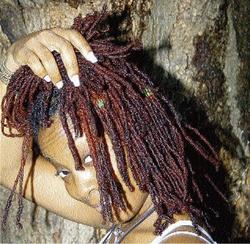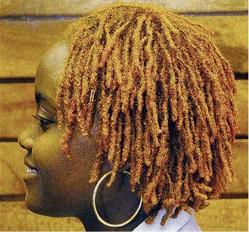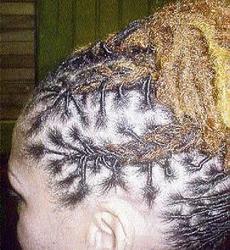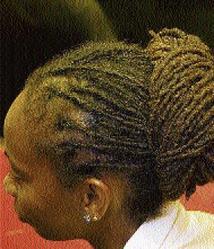Nashauna Drummond • Lifestyle Coordinator




Princess Dunn of Just Natural hair studio notes that many persons who wear locks should not be considered Rastafarians as they are not living the lifestyle and for them it's just a way of wearing their hair.
As to the wearing of make-up, she points out that within the faith it's a personal decision. She says that growing up, they were taught to "embrace yourself" (love yourself for who you are). If you are embracing Rastafarianism, then you would be embracing the lifestyle which includes a healthy diet, therefore, they would have perfect skin and wouldn't have anything to cover up with make-up."
However, she reiterates that the use of make-up is based on a personal choice.
Lock care
Dunn notes that whether locks are worn for religious or cosmetic reasons, natural products are still best to use. She explains that many products are branded as natural but that may just be a ploy to tap into that niche of consumers. She recommends products from Countryfarm House on Deanery Road as they have authentic natural products made from soy. She also recommends Taliah Waajid brand.
She notes that the consistency of natural products are different from those chemically treated and though they may not groom the hair as well as those infused with chemicals, it's still better for the hair.
Bees' wax
She notes that the use of bees' wax by many to groom their locks, especially in the early stages of locking, is a big no-no. She explains that bee wax is very heavy and sticky so it was used initially by Caucasians to cultivate their locks. Because of how sticky it is, it holds that texture of hair together. However, that stickiness also holds dust particles, lint, etc., which causes a build-up. She notes that when locking, depending on the texture of the hair, locks should be washed every six-eight weeks.
The trademark locks of Rastafarians have now become a popular hairstyle. Locks portray what many believe is their mantra of natural beauty as it is felt that that they should not process their hair or wear make-up.
Whether natural or locked, hair should be well moisturised. - photos by Winston Sill/Freelance Photographer
Right: Josett Campbell's short locks are worn loose but can be enhanced with beads, metal clips and other hair ornaments.
The scalp, which is skin, is kept clean with dry shampoos that do not require water.Whether locking or keeping your hair natural, here are five easy care steps.
Moisturise
Always moisturise your hair as often as necessary. When hair becomes dry, it tends to be very brittle.
Cover hair at night.
While sleeping, natural hair or locks tend to attract a lot of lint and this can build up. Also, it's best to use a silk sleeping cap, as cotton or other types of material can absorb the moisture from the hair.
Use liquid moisturiser instead of paste. Paste does not absorb easily and sometimes, a film is left on the hair which causes a build up.
Shampoo hair no less than once every two weeks.
Be creative and vary your styles Natural or lock is not limited; there are quite a variety of ways to vary your look. If you have locks, you can plait them it and get crimp or put rollers in and get curls.
Just Natural Hair Studio, located at Bob Marley Museum at 56 Hope Road, will be moving to shop #45 at Pulse Complex 35a Trafalgar Road.
Lock extensions created with human hair at Just Natural Hair Studio. These will give you locks in one day, instead of the lengthy process of locking which can take six months to one year. - Contributed
Natural hairstyles have versatility too; you can put it up in a bun for formal occasions. - Winston Sill/Freelance Photographer

